Description
Indonesia Flores Laga Lizi
Anaerobic Natural
This coffee from the island of Flores stands out with its complex notes of cranberry and red grape, complemented by a long chocolate finish.
FARM/COOP/STATION: Various
VARIETAL: Linie S-795/Jember
PROCESSING: Anaerobic Natural
ALTITUDE: 1,200 to 1,500 meters above sea level
OWNER: Various smallholder farmers
SUBREGION/TOWN: Wolo Wio, Ngada
REGION: Flores
FARM SIZE: <1 hectares on average
HARVEST MONTHS: Sumatra: April-June (main crop) & Nov-Jan; year-round (fly crop)
About this coffee
“Laga Lizu,” meaning “above the clouds” in the Bajawa language, originates from one of Indonesia’s most renowned coffee regions. Bajawa, located in the Ngada district on Flores island, is known for its matrilineal society, where land ownership is passed down through women. Many women in the region own and manage their family coffee farms.
Flores is celebrated not only for its coffee but also for its rich cultural heritage, seen in traditional villages like Bena and Waerebo, and its stunning natural landmarks such as Kelimutu Lake and the habitat of the iconic Komodo dragon. The coffee here thrives in loamy, volcanic soil, fed by the nearby active volcanoes Inerie, Ebulobo, and Wawomudha—soil that resembles rich chocolate cake in texture and color.
Coffee plays a central role in Bajawa culture. Visitors are always greeted with a hot cup of black coffee, a symbol of hospitality. Nearly every household has a coffee farm, and multiple households often share a pulper, ensuring a high standard of parchment quality.
Sucafina recently collaborated with the local community to establish a new processing facility for the 2024 harvest. Beyond traditional wet hulling, the facility now produces anaerobically fermented fully washed, honey, and natural process coffees, expanding the range of offerings from this unique region.
Cultivation
In Bajawa, farming is typically polyculture. Coffee farms are interplanted with crops like ginger (halia) and staples such as colocasia (talas) and chayote (labu), used primarily as pig feed. Most farmers are smallholders, with an average farm size of just 0,66 hectares. Organic farming practices dominate, aided by the region’s frequent mist and cloud cover.
Coffee cultivation is concentrated on the island’s rugged volcanic slopes, where the fertile, nutrient-rich volcanic soil contributes to the production of high-quality coffee. By fostering collaboration and innovation, coffees from Flores continues to shine as a distinctive origin for exceptional quality.
Harvest & post-harvest
Ripe cherry is harvested in from morning through the early afternoon. After intake, cherry is anaerobically fermented for 72 hours then dried on racks from approximately 7 days. Once cherry reach the right level of moisture it is stored in the cooperative warehouse until it is shipped to our partner mill for further quality control, hulling, grading, and final hand-sorting preparations for export.
Coffee in Indonesia
Indonesia has a long coffee producing history, but recently their coffees have been overlooked by the specialty market. Thanks to our innovative and ever-expanding supply chain, we are proud to bring you high-quality coffees from many of Indonesia’s unique regions, accompanied by in-depth traceability information.
Indonesia is perhaps best known for its unique wet hulling process (giling basah). Though its exact origins are unclear, wet hulling most likely originated in Aceh during the late 1970s.
Wet hulling’s popularity can be attributed to producers’ need for prompt payments. It was also adopted specifically by many producers who lacked the drying infrastructure that was needed to shelter drying parchment from the high humidity and inconsistent rainfall typical in Sumatra. At higher elevations with constant humidity and unpredictable rainfall, drying can prove to be slow, risky and difficult.
About Flores
Flores is one of the smaller islands in the Indonesian archipelago. It is only 580 kilometers long. The island is located 320 kilometers to the east of Bali.
Most coffee production on Flores is generally situated on the rugged slopes of the island’s many active and inactive volcanoes. Volcanic soil is fertile and verdant and helps with high-quality coffee production.
Production on the island is predominately shade-grown, and historically, semi-washed home processing had been the norm. However, due to industry growth, this traditional processing has increasingly given way more to Fully washed and Wet Hulled methods
Information and pictures sourced from Sucafina specialty coffee
How to store coffee at home
To keep your coffee as fresh as possible, you need to protect your coffee from air, sunlight, heat, and moisture. These all will contribute to making it stale and lose flavour.
We suggest keeping your coffee in an airtight container, in a cool, dry cupboard. Our bags all have a de-gassing valve, to let out CO2 that the beans produce once roasted, it’s not just there to sniff the coffee, and a reusable ziplock. So if you don’t have a fancy coffee jar just push the air out the bag, zip the lock and give the bag another squeeze to get any remaining air out.
Do not store your coffee in the fridge. Roasted coffee absorbs moisture from the air (hygroscopic) and will also take up surrounding aromas. The aromas and moisture levels in the fridge will react with the coffee and delicate flavours will deteriorate.
Need help on which grind size? Click here
News Letter
Fancy 15% off a coffee order? Then sign up to our news letter for a discount code, along with being the first to know about new coffees, special offers, tips and tricks.
Want to know more about Bell’s Beans?
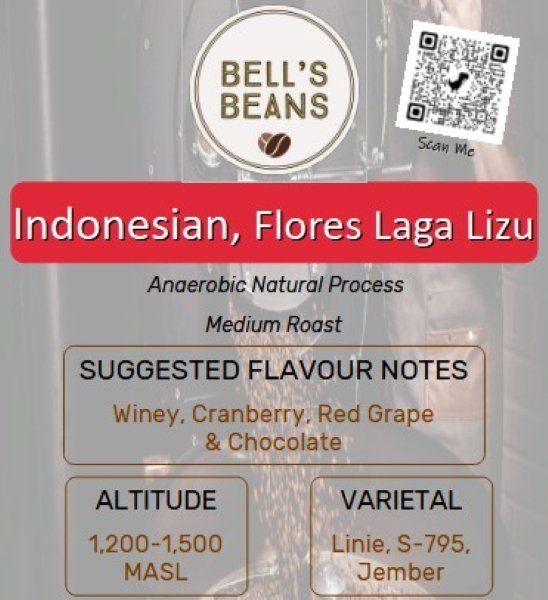

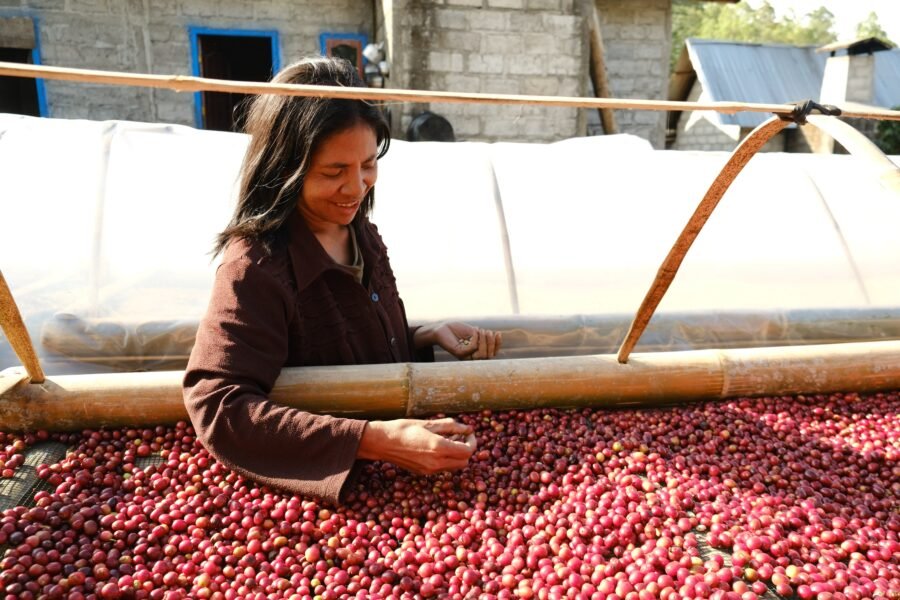





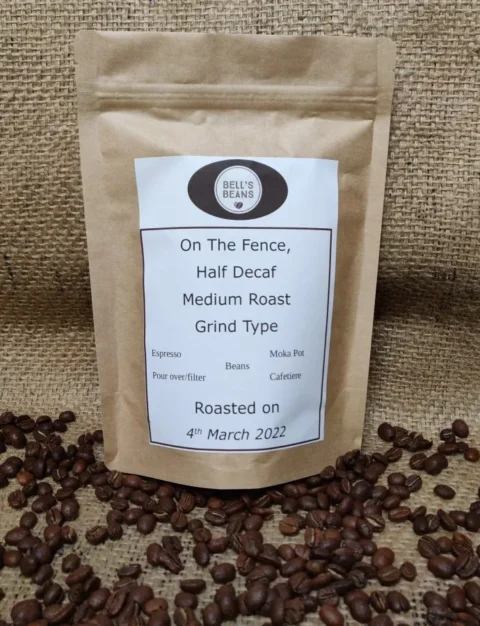
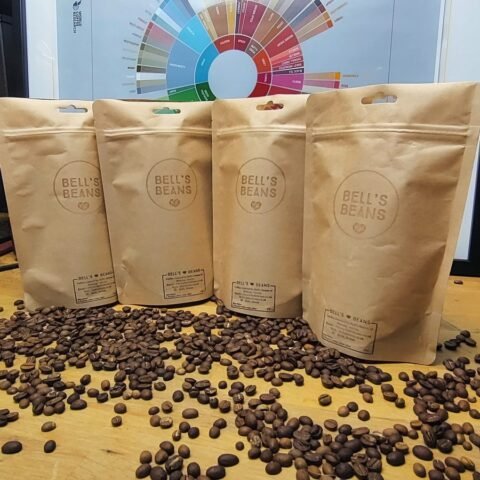
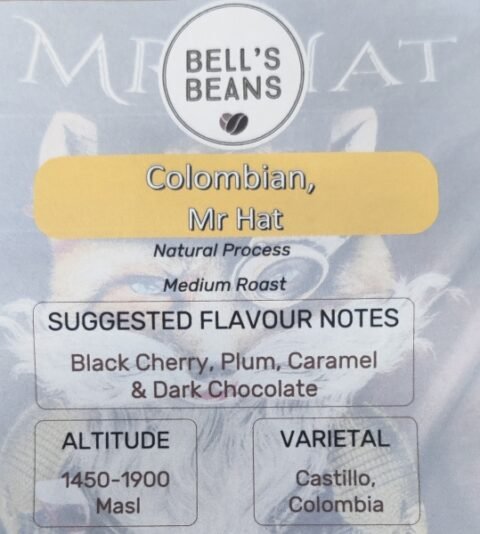
Serhat Ugurlu –
We decided to give this a try after Chris offered a cup of it as a part of his tasting selection for the day. And what a tasting it was! The term ‘winey’ fits really well to the taste profile of this coffee. Also makes a great iced americano. We will definitely be buying another pack soon.
Chris Bell –
Thanks for the review Serhat!
So happy that you enjoyed it and that my tastings at markets helped you so much.
As you liked this keep an eye out for other coffees that have had some fermentation processes done on them like natural, anaerobic, carbonic macerated etc
Chris